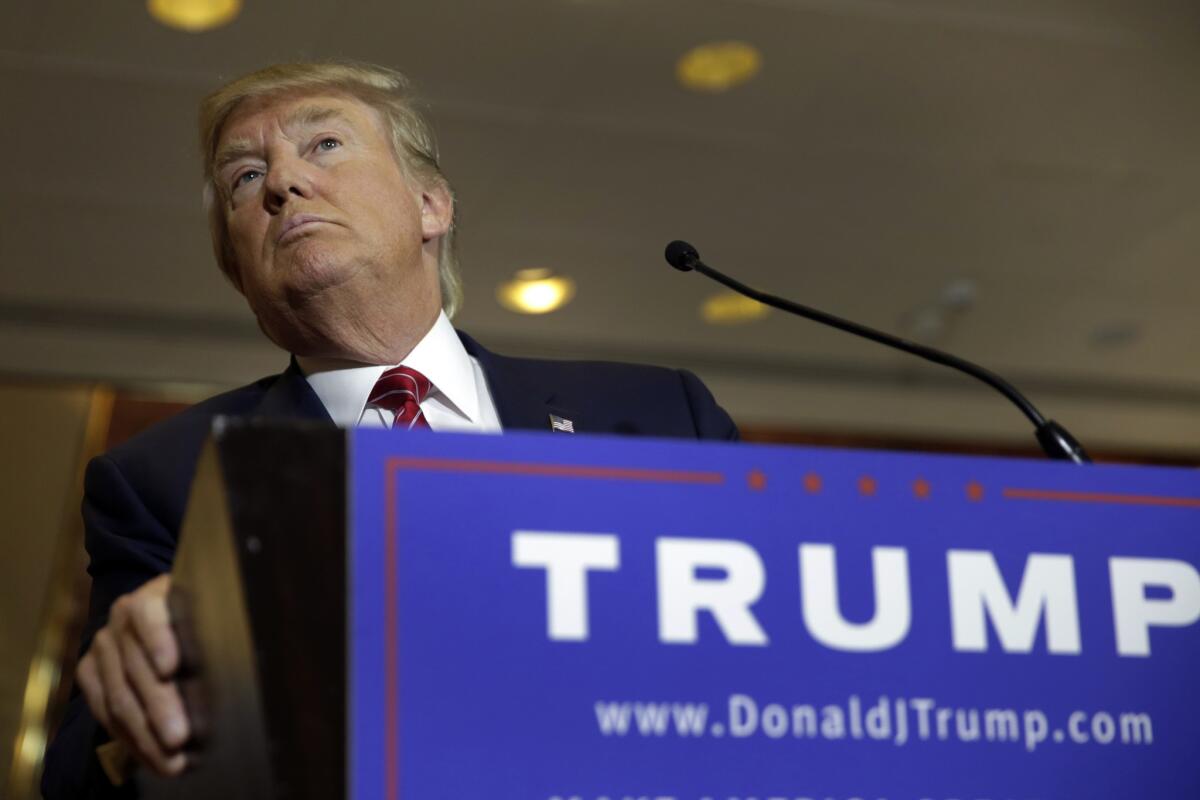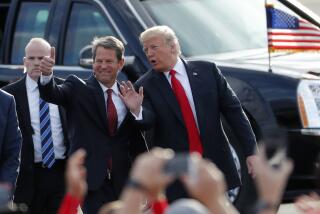What’s behind Republican voters’ support of Trump? Anger at Republicans

Republican presidential candidate Donald Trump listens to a question at a news conference in New York last week.
- Share via
After years of raging against President Obama, unhappy conservatives have a new target for their anger and disgust: the Republicans in Congress.
The GOP seized control of the House in 2010 and four years later took the Senate. Yet even with those majorities, Republican lawmakers have failed to achieve such conservative priorities as rolling back Obamacare, their derisive name for the national healthcare law, or cracking down harder on illegal immigration.
The controversial Keystone XL oil pipeline is no closer to being built – indeed, it may soon be dead – tough antiabortion legislation has languished in the Senate, and a fiercely disputed nuclear deal with Iran seems virtually certain to take effect, despite near-unanimous opposition from Republicans in Congress.
In short, as many see it, the promise of the 2010 tea party movement and its 2014 echo have been dashed on the marble steps of the Capitol.
TRAIL GUIDE: All the latest news on the 2016 presidential campaign >>
“People feel betrayed,” said Greg Mueller, a longtime conservative activist and campaign strategist. “They feel like they keep working and fighting to elect Republicans to get us back to a limited government approach to life, and all they get is more spending, more taxes and people who are afraid to fight liberal Democrats.”
A big beneficiary of that frustration has been Donald Trump.
One of the curiosities of the 2016 presidential campaign has been the way the blunt-spoken billionaire surged to the top of Republican polls despite his relatively short party residence and history of statements —favoring higher taxes on the well-to-do, endorsing government-run healthcare, backing certain gun controls — at odds with so much of the party’s prevailing orthodoxy.
Trump has trimmed some of his positions and reversed others — he now opposes legal abortion, for instance — as he seeks the GOP nomination, a process he likens to Ronald Reagan’s evolution from New Deal Democrat to conservative icon (a comparison that glosses over the length and depth of Reagan’s conversion).
But Trump’s appeal is not so much about issues as attitude.
The reason for his success is simple, observers say: Trump is giving unsparing voice to the contempt many conservatives feel toward the political leadership in Washington, Democrat and Republican alike. The scorn runs so deep, it overrides whatever differences voters may have with Trump over his garish lifestyle, his patchwork philosophy or past stances on particular issues.
“They don’t see any difference between Nancy Pelosi and John Boehner, or Harry Reid and Mitch McConnell,” said Sal Russo, a longtime GOP strategist, referring to the Democratic and Republican leaders of the House and Senate.
“People are just sick and tired of politics as usual, where nothing ever changes,” said Russo, who helped engineer the rise of the tea party protest movement. “Anybody who helps them vent their frustration at the system is an appealing candidate.”
It’s not just Trump.
Collectively, the three candidates with zero experience in elective office — real estate magnate Trump, neurosurgeon Ben Carson and businesswoman Carly Fiorina — account for roughly half the support in surveys of Republican primary voters.
The candidate who most embodies the GOP establishment, former Florida Gov. Jeb Bush, lags far behind, trailing both Trump and Carson, in third place or worse, depending on the poll. If anything, his dynastic name and inherited support from his father and brother, the past Presidents Bush, has worked to his detriment.
Establishment Republicans “keep asking us to elect them,” said Mueller, who worked for past insurgent presidential hopefuls Patrick J. Buchanan and Steve Forbes and now advises a pro-Fiorina political action committee. “The question is a big fat ‘for what’?”
Mindful of that sneering sentiment, others in the GOP field are also assailing the party’s leadership.
NEWSLETTER: Get the day’s top headlines from Times Editor Davan Maharaj >>
Freshman Republican Sen. Ted Cruz of Texas is essentially running as an outsider from within, excoriating “the Washington cartel” and even calling McConnell a liar during a July debate on the Senate floor. The attack, a serious breach of protocol, drew a stern rebuke from Cruz’s Senate colleagues but was cheered by admirers, including conservative radio titan Rush Limbaugh.
“Finally,” he said, “Cruz vents the frustration that every Republican voter has felt with Congress since 2010.”
Cruz joined forces with Trump on Wednesday at a Capitol Hill rally opposing the nuclear deal with Iran.
Gov. Scott Walker of Wisconsin, a onetime GOP front-runner who has fallen far back in the large pack as Trump continues to lead in polls, has adopted some of the real estate tycoon’s pointed anti-Washington rhetoric.
Calling in to Glenn Beck’s radio program, Walker assailed McConnell and other party leaders for a lack of accomplishments and insufficient vigor attacking Obama.
“I hear it all the time, and I share that sentiment,” Walker said. “We were told if Republicans got the majority in the United States Senate, there would be a bill on the president’s desk to repeal Obamacare. It is August. Where is that bill? Where was that vote?”
Republicans in the House have voted more than 50 times without success to eliminate all or part of the law, but McConnell has not found a way around Democrats’ ability to filibuster in the Senate.
There is, of course, a huge distance between the facile statements of the campaign trail and the way government works.
David Winston, a political advisor to the GOP leadership in Congress, noted that, dispiriting though it may be for Republicans, there is only so much they can achieve lacking a filibuster-proof Senate majority and a president of their own party.
He offered a glass-half-full defense of the Republican majority — “What would have happened if Pelosi had been speaker?” — and suggested that at a certain point the GOP’s many would-be presidents would “have to stop pointing fingers and show the solutions they have ... and their endgame and the strategy for how those become law.”
Meantime, a recent Des Moines Register-Bloomberg Politics poll found 91% of Republicans surveyed in Iowa, the first state to vote in 2016, were either “unsatisfied” or “mad as hell” with the political status quo. (The figure was 82% among Democrats.)
More specifically, three-quarters of likely GOP caucus-goers expressed frustration with the Republicans in charge of Congress.
That’s not likely to change anytime soon.
Twitter: @markzbarabak
MORE POLITICS COVERAGE
Report finds ‘reason to believe’ Rep. Honda’s campaign blurred ethics lines
Hillary Clinton’s secret weapon in campaign finance reform: Shame
Is Donald Trump more than just a political fad?
More to Read
Sign up for Essential California
The most important California stories and recommendations in your inbox every morning.
You may occasionally receive promotional content from the Los Angeles Times.











